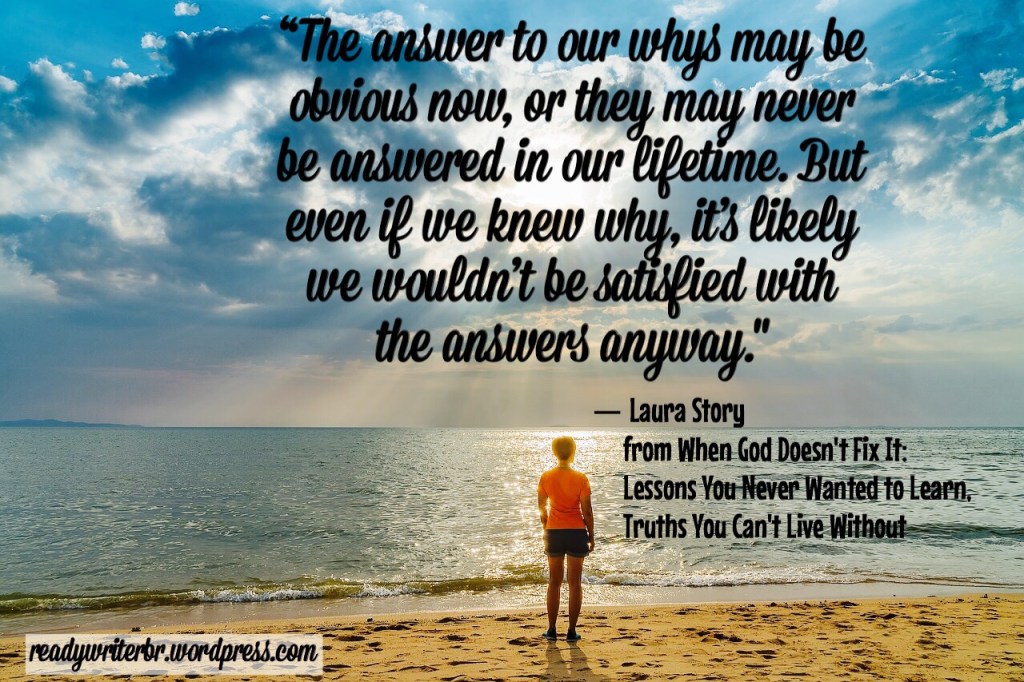WHY? A little word, but a big cry from the hearts and minds of those who suffer. I know it’s a question I’ve asked many times in the suffering that has touched my life.
Why did God allow the accident that took the life of our firstborn Teresa and left me with life-altering disabilities? Why was our son David born with major birth defects resulting in profound mental retardation? Why did God stop David’s Massive Infantile Spasms when the elders from our church prayed for him but not heal the damage already done? None of my why questions have been answered.
Why was also the primary question asked by Job and his friends. Job’s friends had their own answers to the why question, but their conclusions were wrong. This man of faith, integrity, and endurance wanted to know WHY, but that’s one question God does not answer in the book of Job.
While in many of Job’s comments the word why is implied rather than actually spoken, these are some specific whys Job asks:
- “Why did I not perish at birth, and die as I came from the womb? Why were there knees to receive me and breasts that I might be nursed?” ( Job 3:11-12 NIV)
- “Why is light given to those in misery, and life to the bitter of soul,” (Job 3:20 NIV)
- “Why is life given to a man whose way is hidden, whom God has hedged in?” (Job 3:23 NIV)
- “Why have you made me your target? … Why do you not pardon my offenses and forgive my sins?” (Job 7:20b, 21a)
- “Why do you hide your face and consider me your enemy?” (Job 13:24 NIV)
- “Why do the wicked live on, growing old and increasing in power?” (Job 21:7 NIV)
And I could go on. But the key understanding I want to emphasize is that none of these questions are answered in the book of Job. Other passages in the Bible do address some of these issues, but God did not answer any of them in relation to Job’s suffering.
So what can we learn from Job’s words in the book written about his life?
- God does not condemn us when we cry out to Him in honesty when we face suffering. We are currently doing a study in God-Living Girls with Chronic Illness on the book Discovering Hope: Beginning the Journey Toward Hope in Chronic Illness, by Cindee Snider Re. This week’s study included a section called “Exploring Lament.” In it, Cindee defines lament as “a necessary strand in our story, a vital thread in the fabric of our faith, and an honest Biblical expression of pain.” She adds, “True lament isn’t an expression of weakness, whining or self-pity. It’s an authentic expression of faith.”
- While Job did sometimes pass the invisible line between biblical lament as self-pity, his words in these chapters also include “authentic expression(s) of faith.”
- Job held onto his belief in God’s mercy. “How then can I dispute with him? How can I find words to argue with him? Though I were innocent, I could not answer him; I could only plead with my Judge for mercy.” (Job 9:14-15 NIV)
- He did not completely let go of hope. “Though he slay me, yet will I hope in him; I will surely defend my ways to his face.” (Job 13:15 NIV)
- Job continued to believe in God as his redeemer. “I know that my redeemer lives, and that in the end he will stand on the earth. And after my skin has been destroyed, yet in my flesh I will see God;” (Job 19:25-26 NIV)
- And finally, Job trusted that his trials would not last forever; they would accomplish their purpose, and then they would end. “But he knows the way that I take; when he has tested me, I will come forth as gold.” (Job 23:10 NIV)
As we study the book of Job together, I hope you are learning some new truths from these chapters. Job definitely did not handle his overwhelming suffering perfectly – and none of us who face intense trials will either. But from these chapters on Job’s responses to his accusers and conversation with his Maker, I hope you’ll take away three things:
- God doesn’t condemn us for our whys, but He also may not answer these questions.
- When God doesn’t answer our whys, we need to make the choice to trust Him without understanding.
- Honest lament expressed with faith is a biblical way to deal with the emotional turmoil caused by a life filled with trials.
Whether you personally live with chronic illness, are currently experiencing other forms of suffering or have in the past, or simply know others who are facing extremely painful circumstances in their lives and want to be able to effectively minister to them, my prayer is that these principles I’ve shared will help you in your individual situation.





Leave a reply to Lesley Cancel reply